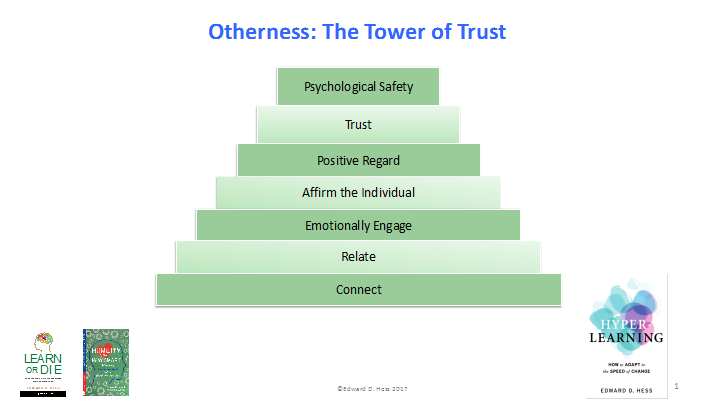
In the digital age, leaders must excel at managing their ego, thinking and emotions, their emotional intelligence and their otherness — the ability to connect, engage and relate emotionally with others in positive ways. Women may be more naturally positioned to do so.
by Edward D. Hess
July 8, 2020
Today, women hold only 37 CEO positions in Fortune 500 companies.
In 2017, women held only about 10 percent of the top executive positions (CEOs, chief financial officers and the next three highest-paid executives) at U.S. companies, according to a Pew Research Center analysis of the Standard & Poor’s Composite 1,500 Companies.
I predict that within 10 years, half of Fortune 500 CEOs will be women.
Why?
In the digital age, leaders must excel at managing themselves (one’s ego, one’s thinking and one’s emotions), emotional intelligence and otherness (the ability to connect, engage and relate emotionally with others in positive ways). Doing so results in mutual caring and trusting relationships that enable the highest levels of human emotional, cognitive and behavioral collaborative performance.
The digital age will dehumanize the workplace by automating tens of millions of jobs, substantially reducing human headcount, while at the same time it will require organizations to become much more humanistic with a new way of working — one that will enable human beings to excel at the emotional, cognitive and behavioral capabilities that will add value in ways that the technology will not be able to do (at least for the near future).
That new way of working will require leaders who excel at having high emotional intelligence, humility and empathy, with a humanistic, compassionate mindset — not a self-focused, competitive mindset. Such leaders will respect and honor every person’s human dignity in ways that liberate people to perform at their highest capabilities.
And that new way of working requires a humanistic, emotionally safe, positive work environment — not an individualistic, survival-of-the-fittest, competitive environment. That requires a new way of organizing, managing, leading and behaving that maintains organizational rigor and discipline but is significantly more caring, compassionate and emotionally positive.
For the purposes of this article, I define men as men raised in the United States or in foreign countries that have cultures that are very individualistic, competitive and male-dominated. Generally speaking, the new-way-of-working skills come much more naturally to women than to men, and the research shows it.
Digital-Age Skills
In the digital age, human beings will add value by doing the complex skills that the technology will not be able to do well: creative, imaginative and innovative thinking; exploring the unknown; engaging in higher-order critical thinking; making decisions in environments with a lot of uncertainty and little data; and emotionally connecting in positive ways with other human beings in the collaborative creation and delivery of services and products. These skills require more than thinking skills. They require emotional and human connection skills.
The science of adult learning is clear. The human challenge in the digital age is this: We are individually suboptimal learners because our reflexive ways of being are to seek confirmation of what we already believe, seek affirmation of our egos, and maintain the cohesiveness of our mental models. The science is also clear that we need others to help us think and engage at our highest levels. That means that most work in the digital age that involves thinking and emotionally engaging with others will be done in teams — a special kind of teams.
Caring, Trusting Teams
Caring, trusting teams are small groups of people who care deeply about each other as unique human beings, have compassion for each other and trust each other. This means trusting that no one will “do you harm” and believing that everyone is totally invested in each other’s personal development and success. That enables two integral and interdependent conditions necessary for the highest levels of human collaboration: trust and psychological safety. And caring, trusting teams are foundational to having the types of authentic, transparent learning conversations needed to perform the human digital-age skills. Those types of conversations are high-quality, meaning-making conversations.
High-Quality, Meaning-Making Conversations
High-quality, meaning-making conversations are not about advocacy, self-promotion or competition. They are about seeking mutual understanding. You are seeking to understand others and you are seeking to be understood by others in a caring, trusting, noncompetitive manner that is respectful of everyone’s human dignity. Those types of conversations require real listening and asking questions, not just advocating one’s position. They require one to tame their ego and emotional defensiveness as well as their fears of not being liked and not appearing smart. Those types of conversations lead to the end game: high collective intelligence.
Collective Intelligence
Effective collaboration requires collective intelligence. The best research on how to create collective intelligence has been done at MIT and Carnegie Mellon. Here are some of the findings: A group’s level of collective intelligence is correlated with (1) the social sensitivity of team members, (2) conversational turn-taking and (3) the proportion of women in the group. Social sensitivity involves perception of social cues, reading others’ emotions and empathy. Research shows that, on average, women are more socially sensitive than men. In team activities, men are found in general to be more autocratic and transactional and to exhibit socially dominant behaviors, while women are found to be generally more interpersonal and democratic (this according to Julia B. Bear and Anita Williams Wooley’s “Role of Gender in Team Collaboration and Performance,” published in Interdisciplinary Science Reviews in 2011).
Multiple research studies have found that the most effective collaborative teams are teams made up of all women. Why? Because the desired emotional skills that underlie collective intelligence that will be necessary for high human performance in the digital age comes much more naturally to many women, and those emotional skills do not come naturally to many men because they were not raised or trained to behave that way.
Those emotional skills require high emotional intelligence, excelling at making positive emotional connections with others and managing one’s emotions. And they require embracing humility and otherness as opposed to being overly self-focused, overly self-protective, and competitive. Caring, trusting, having empathy and humility, and being compassionate are all dependent upon positive emotions. In general, men have not been raised or trained to excel at those skills. They can learn those skills, but many have not done so.

Women Are Generally ‘Wired’ for Digital-Age Success
What does the science say about the general differences between how men think and operate in the workplace compared with women? Women tend to be more relationship-oriented and men tend to be more transaction-oriented. Men tend to view collaboration as a competition, and women tend to view collaboration as a making-meaning conversation in which everyone is to be heard with respect. Men tend to be more narcissistic than women. Men tend to be more into ego, dominance and power than women. Women tend to be more into building meaningful emotional relationships.
Yes, some men are good at the skills that we are talking about, and some women are not good at those needed skills. My point is this: In the digital age, the women who embrace the ways of relating to the world that come naturally to them, rather than emulating how men behave, will be the leaders most able to lead a digital-age workforce.
Men will have the most work to do in order to rewire themselves to excel in the digital age. That is possible. Based on my experience, men can achieve the high levels of interpersonal emotional competencies if they are truly committed to changing their mindsets and behaviors and willing to invest the time every day to transform themselves. Many women, on the other hand, will not have to transform themselves; they will just need to be more of themselves. That is why I believe that half of Fortune 500 CEOS will be women before 2030.



